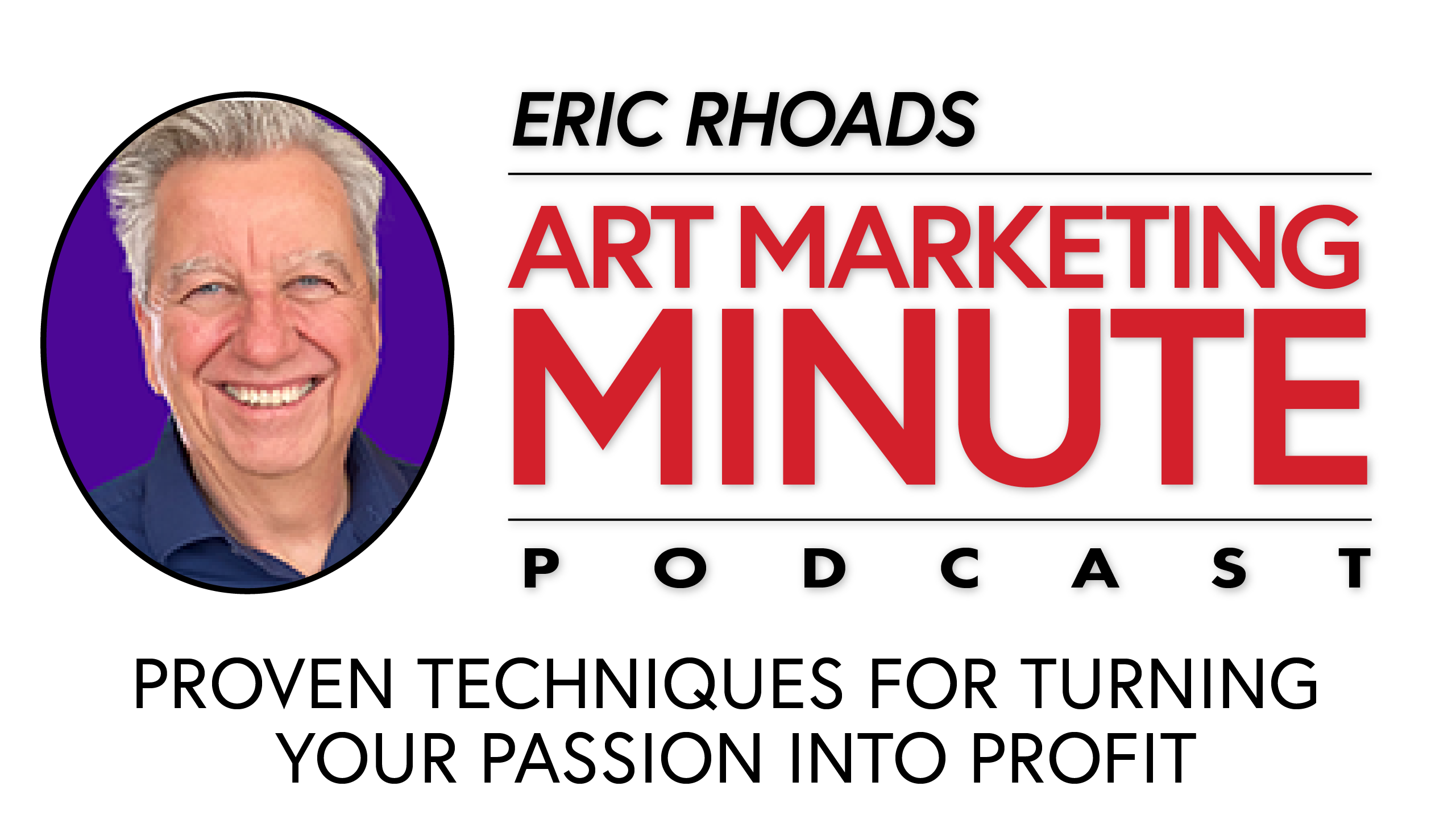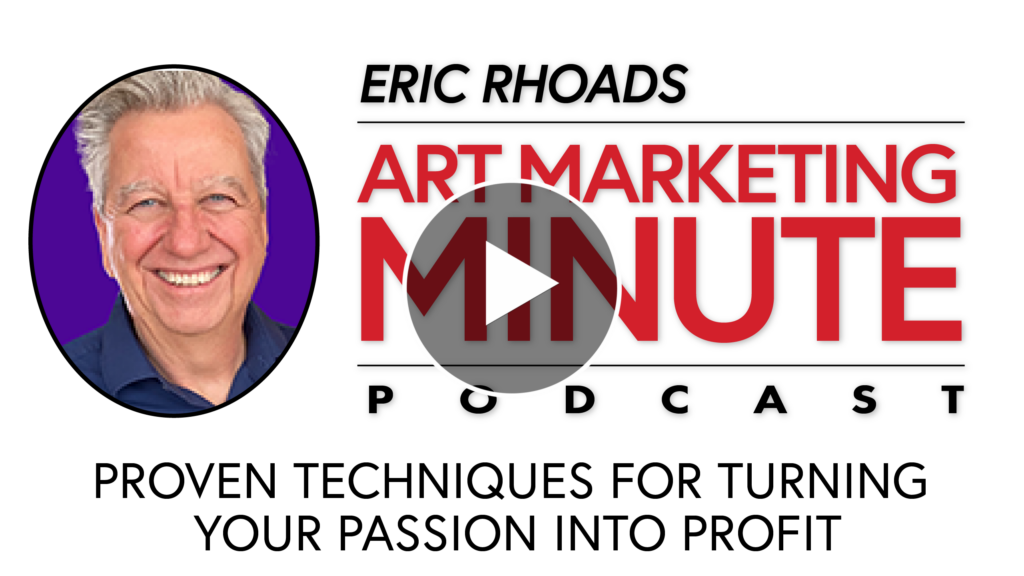Should your painting prices vary by region? What should international artists consider when it comes to selling their art? Eric Rhoads answers in this episode of the Art Marketing Minute Podcast.
In the Art Marketing Minute Podcast, you’ll learn how to sell your art, how to market your paintings, and everything else you need to know in order to have a successful art career. Each episode answers questions from artists by host Eric Rhoads, author of “Make More Money Selling Your Art,” publisher of several art magazines and newsletters, and author of ArtMarketing.com.
Listen to the Art Marketing Minute Podcast: Episode 91 >
Submit Your Art Marketing Question:
What questions do you have about selling your art? Email Eric today at [email protected] (include your name and where you’re from) to hear your question answered on an upcoming Art Marketing Minute Podcast.
FULL TRANSCRIPT of the Art Marketing Minute:
DISCLAIMER: The following is the output of a transcription from an audio recording of the Art Marketing Minute. Although the transcription is mostly correct, in some cases it is slightly inaccurate due to the recording and/or software transcription.
Announcer:
This is the Art Marketing Minute with Eric Rhoads, author of the Amazon best selling book, “Make More Money Selling Your Art.” In the marketing minute we answer your questions to help your art career brought to you by artmarketing.com, the place to go to learn more about marketing. Now, here’s your host, arts magazine publisher, Eric Rhoads.
Eric Rhoads:
Here’s one from Janice Webb. Janice says I’d like to know about pricing for regional markets. I’m selling in Seattle and getting a lot of inquiries from my hometown in Idaho. The question, I think is, should you have a different price in your hometown than you have in Seattle, I think you’re assuming people in your hometown can’t afford the same price as people in Seattle, which may or may not be true. But it might be a story yourself telling yourself, I talk a lot about the stories we tell ourselves because we have this limiting belief. You know, there are probably people driving Mercedes Benz or nice cars, or having big houses in your town in Idaho. If not, maybe it’s an economically depressed area, it’s a different thing. I think the key is, you should have consistency in your pricing. I don’t want to go on a website, you know, if I walk into a gallery in Seattle, and then I look up your name, and I find it on a website and a gallery in Idaho for half the price, I’m not going to be a happy camper, right? And then that’s going to cause all kinds of other problems. And so I don’t think necessarily having different prices is a good idea. Now, sometimes there’s a good reason for it. So for instance, I’ll paint a a nine by 12 figure painting, and I’ll paint a nine by 12. landscape painting, the finger painting might take me five times longer, maybe I’ll ask for a different price for that. But it’s an exception, right? So that’s one of the things you want to think about. Also, you really should be in the places that are going to sell your artwork, you know, it’s not about getting the lowest price, it’s about getting the highest price. And so if you’re selling well in Seattle, you know, do you really need to sell in your hometown, maybe you can pick up another gallery in another market like Seattle, so that you’re selling, you know, get into Santa Fe or something like that. So I think that kind of answers our question.
Here’s a question from Jane. Cameron in England, it doesn’t say we’re in England, James Jane says, You Americans, I think we’re being scolded already. Jane says, you Americans tend to be much more forward about marketing than we are in England. I’m afraid that if I tried some of the tactics in your book, and using a lot of repetition, I might get laughed out of town. Well, Jane, there’s a figure of speech called laughing all the way to the bank. That’s all I can tell you. Three things first, only you know your market, make sure you know your market well, and make sure you’re not telling yourself a story, you know, is this really true? Because I’ve had lots of those stories and reality, they’re never true. You know, somebody will say, well, you email too much. And I know some people don’t like that. But when I don’t email, I don’t sell anything. When I do, things tend to sell. So you’ve got to follow practices in marketing, that are going to work practices in marketing have to do with very compelling headlines, very compelling copy, things that are going to get attention. You know, great marketing works pretty much the same way anywhere. I went to a seminar, a marketing seminar, there was a guy there, I can’t remember his name. But he was from the United Kingdom, and he did seminars in the United Kingdom. And he said, when he started out, he believed this whole idea that you know, and marketing in England is more genteel. So he kind of took that approach and nothing was selling. And so he went to the marketing guru, a guy named Dan Kennedy. And Kennedy basically said, No, no, you got to use the same principle. same principles apply everywhere. You have to have repetition, you have to have compelling copy. Don’t try to be so genteel. So he went out and just did what he recommended he do and all of a sudden, everything started selling. So he was telling himself a story. Great marketing works, great marketing techniques work, people who tried to be quiet and gentle, and, you know, not too obtrusive. Hey, that’s okay, too. You know, you got to try your style, but you got to try and figure out a way to make it work. And part of the problem we suffer with in the world is you know, we suffer with the idea of getting attention. What are you going to do to get attention and clobber people over the head so that they’re going to sit up and take notice because if you’re a little meek little feather in the corner and nobody notices? Well, that’s not going to do any good. But if you stand out if you’re bold, you get noticed. Well, that’s going to do a lot of good and then you can laugh all the way to the bank.
Well, this has been the art marketing minute with me. Eric Rhoads. My goal in life is to eliminate the idea of the starving artist to help your dreams actually come true. So if you want to submit questions, simply email [email protected]. And to learn more about marketing ideas, you can visit Artmarketing.com. Thanks for listening.
How to Submit Your Art Marketing Questions: What questions do you have about selling your art? Email Eric today at [email protected] (include your name and where you’re from) to hear your question answered on an upcoming Art Marketing Minute Podcast.



Leave A Comment